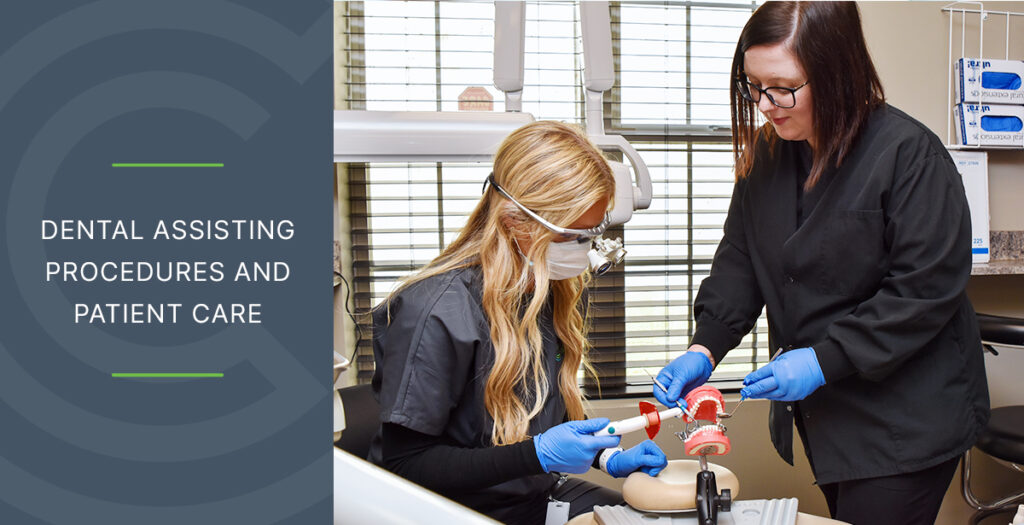
Dental Assisting Procedures and Patient Care
When it comes to providing oral healthcare, dental assistants play a vital role in ensuring a smooth and comfortable experience for patients. Dental assisting procedures and patient care are fundamental skills to building trust, delivering high-quality care, and excelling in this dynamic profession. In this blog, we’ll explore dental assisting procedures and patient care, why it’s important, and the key skills and attributes dental assistants need in their field.
What is Clinical Competency in Dental Assisting?
Clinical competency in dental assisting refers to the ability to perform dental procedures and patient care tasks effectively, safely, and with precision. It encompasses both technical expertise and interpersonal skills, ensuring that dental assistants can contribute meaningfully to patient outcomes and practice efficiency. From assisting in complex procedures to providing emotional support to nervous patients, competency requires a blend of knowledge, skill, and empathy.
Clinical competency is not just about being proficient in dental techniques. It’s about embracing a holistic approach to patient care, focusing on the individual’s overall comfort and well-being during their dental visit.
Why Clinical Competency Matters
1. Improved Patient Outcomes
Competent dental assistants enhance the quality of care provided to patients. Their ability to anticipate the dentist’s needs and provide seamless assistance reduces procedure times and minimizes errors. This directly impacts the patient’s oral health and overall satisfaction.
2. Practice Efficiency
When dental assistants are skilled and well-trained, they contribute to the smooth operation of a dental office. By ensuring that procedures run on time and equipment is properly prepared, dentists can focus on delivering the best care possible.
3. Patient Trust and Comfort
A competent dental assistant knows how to create a calming environment for patients, especially those who may feel anxious about dental visits. Their reassuring presence can significantly reduce stress and build long-term patient relationships.
4. Career Advancement
Clinical competency opens doors for professional growth. Dental assistants with advanced skills may pursue specialized certifications or higher roles within a practice, boosting their career trajectory.
Core Skills for Dental Assisting Procedures and Patient Care
1. Proficiency in Dental Procedures
Dental assistants must be adept at a range of clinical tasks, including:
– Taking and processing X-rays.
– Sterilizing and preparing instruments.
– Assisting the dentist during procedures like fillings, crowns, and extractions.
– Educating patients on post-treatment care and oral hygiene practices.
Developing these skills requires a combination of formal education, hands-on training, and continual learning.
2. Patient Communication and Care
Building rapport with patients is a crucial part of clinical competency. Dental assistants must:
– Clearly explain procedures and answer questions.
– Address concerns with empathy and understanding.
– Offer reassurance to anxious patients, especially children or those with dental phobias.
3. Time Management and Organization
Efficiently managing time and resources is key to ensuring smooth practice operations. This includes:
– Preparing the treatment room ahead of appointments.
– Keeping track of patient records and appointment schedules.
– Anticipating the needs of both the dentist and the patient during procedures.
4. Technical Knowledge and Adaptability
As dental technology evolves, staying updated on new equipment and techniques is vital. Competent dental assistants regularly enhance their knowledge of:
– Digital imaging systems.
– CAD/CAM technology for dental restorations.
– New materials and tools were used in the procedures.
5. Infection Control and Safety Standards
Maintaining a sterile and safe environment is non-negotiable in dental care. Dental assistants must adhere to strict protocols for:
– Sterilizing instruments.
– Using personal protective equipment (PPE).
– Ensuring compliance with OSHA and other regulatory standards.
Building Clinical Competency: Steps for Aspiring Dental Assistants
1. Enroll in a Comprehensive Training Program
Accredited dental assisting programs provide the foundational knowledge and skills needed to excel in the field. These programs often include classroom instruction, lab work, and clinical externships to prepare students for real-world scenarios.
2. Gain Hands-On Experience
On-the-job training is essential for clinical competency. Working under experienced dental professionals helps dental assistants refine their skills and build confidence.
3. Pursue Certification
Obtaining certifications such as the Certified Dental Assistant (CDA) ® credential demonstrates a commitment to excellence and can enhance job prospects.
4. Commit to Lifelong Learning
Continuing education courses and workshops allow dental assistants to stay current with industry trends, expand their skill set, and improve their clinical competency.
5. Develop Soft Skills
Strong interpersonal skills are just as important as technical expertise. Focusing on communication, empathy, and teamwork can make a significant difference in patient care and workplace dynamics.
Overcoming Challenges in Clinical Competency
While clinical competency is rewarding, it’s not without its challenges. Dental assistants often face:
– High-pressure situations during complex procedures.
– Managing diverse patient needs and expectations.
– Keeping up with advancements in technology and practices.
Addressing these challenges requires resilience, a willingness to learn, and support from colleagues and mentors.
The Role of Educational Institutions in Shaping Competent Dental Assistants
Educational institutions play a pivotal role in preparing future dental assistants for the demands of this profession. By offering comprehensive training programs that emphasize technical and soft skills, schools set students on the path to success.
Why Choose Caris College for Your Dental Assisting Journey?
If you’re considering a career in dental assisting, Caris College offers a program designed to equip students with the skills and knowledge needed in this field. With hands-on training, experienced instructors, and a focus on clinical competency.
Learn more by visiting Caris College today and our dental assisting program and take the first step toward a fulfilling career.
Dental assisting procedures and patient care is the cornerstone of the dental field. By developing technical skills, enhancing patient care, and embracing lifelong learning, dental assistants can make a lasting impact on their patients’ lives.
More on dental assisting and patient care